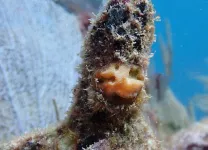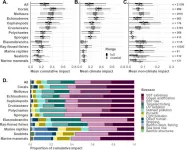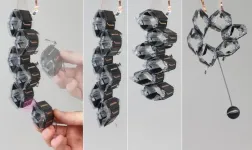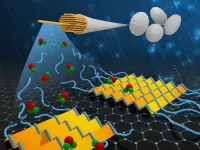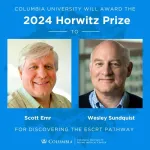(Press-News.org) Associate professor of chemical engineering Bryan Berger received funding from the Environmental Protection Agency to reduce the impact of per- and polyfluoroalkyl substances, known as PFAS, in food and farming communities.
The award is part of the over $15 million the EPA granted to 10 institutions for PFAS reduction research, aimed at improving farm viability and increasing knowledge of PFAS accumulation.
Water sample collection for testing in Limestone, Maine. (Contributed photo)
Known as forever chemicals, PFAS are man-made substances that have been used in industry and consumer products since the 1940s. They often do not easily degrade and can build up in the environment or human body, potentially causing damage. The chemicals can be found in soil, air, water, food and in materials in our homes.
“PFAS adversely affects the health of farmers, animals and crops, threatens the livelihoods of farmers and ultimately harms the well-being of entire communities,” Berger said. “This collaborative work with growers, tribal communities and researchers will help us understand the full scope of the issue on farms, identify and remove sources of potential contamination and find sustainable ways to mitigate it.”
To understand how PFAS accumulates and impacts food sources, Berger and a team of researchers will study how the chemicals permeate soil and crops from contaminated irrigation water, evaluate how that uptake is influenced by other chemicals and environmental conditions, and develop tools for farms to identify sources of PFAS. Early work to support key experiments leading to this opportunity was provided by the Jefferson Trust.
For the study, researchers will collect samples of animal and plant tissue to determine how PFAS accumulates in food webs and how they may spread to native plants of cultural importance to tribal communities. The team hopes to develop recommendations for growers on how to reduce PFAS levels.
Additionally, the project will provide critical data for understanding how tribal and rural communities who are especially at risk are exposed to PFAS to help protect them.
The research team also includes Michael P. Timko, the Lewis & Clark Professor of Biology at the University of Virginia, among others.
About UVA Engineering: As part of the top-ranked, comprehensive University of Virginia, UVA Engineering is one of the nation’s oldest and most respected engineering schools. Our mission is to make the world a better place by creating and disseminating knowledge and by preparing future engineering leaders. Outstanding students and faculty from around the world choose UVA Engineering because of our growing and internationally recognized education and research programs. UVA is the No. 1 public engineering school in the country for the percentage of women graduates, among schools with at least 75 degree earners; among the top engineering schools in the United States for the four-year graduation rate of undergraduate students; and among the top-growing public engineering schools in the country for the rate of Ph.D. enrollment growth. Our research program has grown by 95% since 2016. Learn more at engineering.virginia.edu.
END
UVA Engineering professor awarded $1.6M EPA grant to reduce PFAS accumulation in crops
2024-09-18
ELSE PRESS RELEASES FROM THIS DATE:
UVA professor receives OpenAI grant to inform next-generation AI systems
2024-09-18
Superintelligence — AI systems that surpass human intelligence — could be just a decade away, raising urgent questions about how to ensure their safety and alignment with human values, according to OpenAI.
These AI systems could be hugely beneficial, but more sophisticated systems create the possibility for unpredictability. Misinterpreting human values or intent, algorithmic biases and security risks are all cause for concern, especially with highly developed AI systems where the potential consequences are far greater.
Yu Meng, assistant professor of computer science at ...
New website helps researchers overcome peer reviewers’ preference for animal experiments
2024-09-18
WASHINGTON, D.C.—A new website, AnimalMethodsBias.org, created by the Coalition to Illuminate and Address Animal Methods Bias (COLAAB), provides researchers guidance and resources aimed at helping them successfully publish nonanimal biomedical research by overcoming the preference some peer reviewers have for animal-based research methods.
“We recently found that half of researchers surveyed had been asked by reviewers to add an animal experiment to their otherwise animal-free study,” says Catharine ...
Can the MIND diet lower the risk of memory problems later in life?
2024-09-18
MINNEAPOLIS – People whose diet more closely resembles the MIND diet may have a lower risk of cognitive impairment, according to a study published in the September 18, 2024, online issue of Neurology®, the medical journal of the American Academy of Neurology. Results were similar for Black and white participants. These results do not prove that the MIND diet prevents cognitive impairment, they only show an association.
The MIND diet is a combination of the Mediterranean and DASH diets. It includes green leafy vegetables like spinach, ...
Some diabetes drugs tied to lower risk of dementia, Parkinson’s disease
2024-09-18
MINNEAPOLIS – A class of drugs for diabetes may be associated with a lower risk of dementia and Parkinson’s disease, according to a study published in the September 18, 2024, online issue of Neurology®, the medical journal of the American Academy of Neurology.
The study looked at sodium-glucose cotransporter-2 (SGLT2) inhibitors, which are also known as gliflozins. They lower blood sugar by causing the kidneys to remove sugar from the body through urine.
“We know that these neurodegenerative diseases like dementia and Parkinson’s disease are common and the number of cases is growing as the ...
Propagated corals reveal increased resistance to bleaching across the Caribbean during the fatal heatwave of 2023
2024-09-18
SECORE International’s Coral Seeding approach utilizes assisted reproduction, the breeding of corals, for reef restoration. This approach is realized within a training and partner network throughout the Caribbean. Now, a peer-reviewed study shows that all the effort was worthwhile: during the devastating heatwave in the Caribbean in 2023, the young, bred corals out on the reef stayed healthy while most of the remaining wild corals bleached and many died in the aftermath.
The summer of 2023 was deadly for many corals in the Caribbean Basin. An unprecedented heatwave, in intensity as well as in duration, hit the Caribbean with catastrophic ...
South African rock art possibly inspired by long-extinct species
2024-09-18
A mysterious tusked animal depicted in South African rock art might portray an ancient species preserved as fossils in the same region, according to a study published September 18, 2024 in the open-access journal PLOS ONE by Julien Benoit of the University of the Witwatersrand, Johannesburg, South Africa.
The Horned Serpent panel is a section of rock wall featuring artwork of animals and other cultural elements associated with the San people of South Africa, originally painted between 1821 and 1835. Among the painted figures is ...
Even marine animals in untouched habitats are at risk from human impacts
2024-09-18
Climate change and a range of other human impacts are putting marine animals at risk of extinction – even those living in almost pristine marine habitats and diverse coastal regions – reports a new study by Casey O'Hara of the National Center for Ecological Analysis and Synthesis at the University of California, Santa Barbara, USA, and colleagues, published September 18, 2024 in the open-access journal PLOS ONE.
Human activities on land and sea, in combination with climate change, are degrading coastal ...
Hexagonal electrohydraulic modules shape-shift into versatile robots
2024-09-18
Stuttgart – Scientists at the Max-Planck-Institute for Intelligent Systems (MPI-IS) have developed hexagon-shaped robotic components, called modules, that can be snapped together LEGO-style into high-speed robots that can be rearranged for different capabilities. The team of researchers from the Robotic Materials Department at MPI-IS, led by Christoph Keplinger, integrated artificial muscles into hexagonal exoskeletons that are embedded with magnets, allowing for quick mechanical and electrical connections. The team’s work, “Hexagonal electrohydraulic modules for rapidly reconfigurable high-speed robots” will be published in Science ...
Flexible circuits made with silk and graphene on the horizon
2024-09-18
RICHLAND, Wash.—After thousands of years as a highly valuable commodity, silk continues to surprise. Now it may help usher in a whole new direction for microelectronics and computing.
While silk protein has been deployed in designer electronics, its use is currently limited in part because silk fibers are a messy tangle of spaghetti-like strands.
Now, a research team led by scientists at the Department of Energy’s Pacific Northwest National Laboratory has tamed the tangle. They report in the journal ...
Scott Emr and Wesley Sundquist awarded 2024 Horwitz Prize for discovering the ESCRT pathway
2024-09-18
NEW YORK, NY (September 18, 2024)—Columbia University will award the 2024 Louisa Gross Horwitz Prize to Scott Emr and Wesley Sundquist for discovering the ESCRT (Endosomal Sorting Complexes Required for Transport) pathway and revealing how it works.
ESCRT (pronounced “escort”) complexes deform the cell membrane and bend parts of it away from the cytoplasm, the space that houses all material inside a cell. This unique process plays an essential role in keeping cells healthy by packaging and sorting molecules, removing waste, and regulating important functions such as cell division, neuron remodeling, ...


